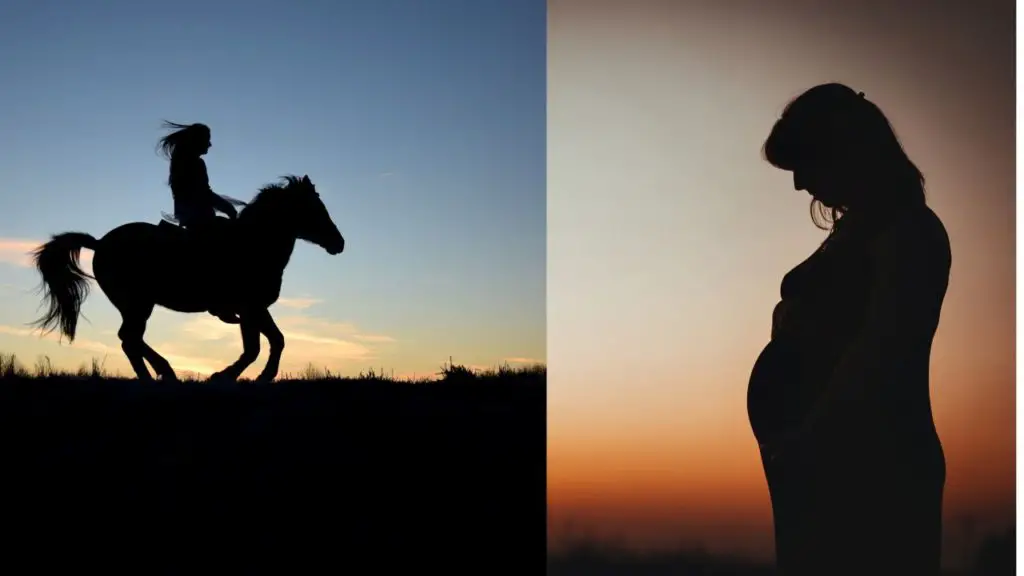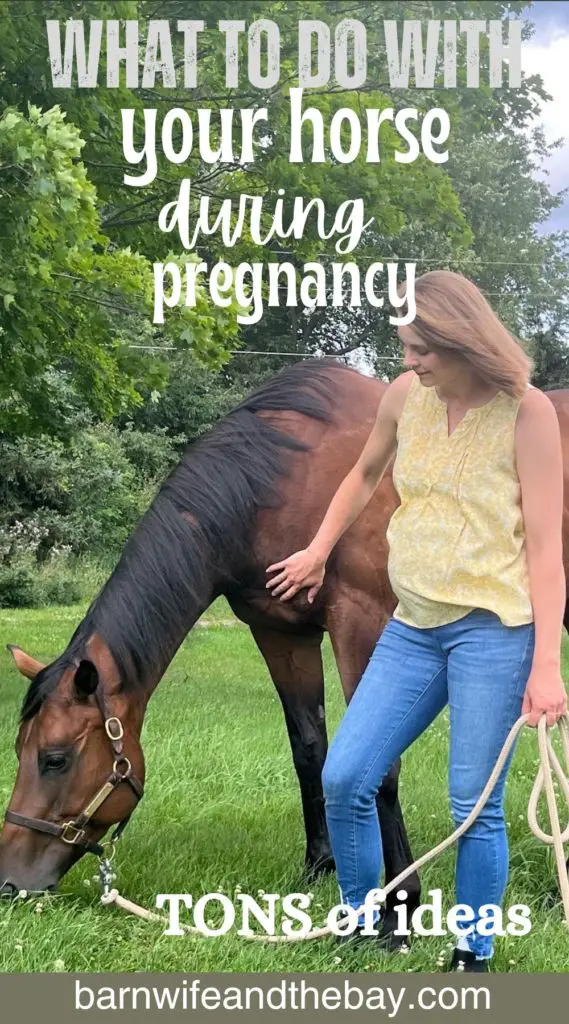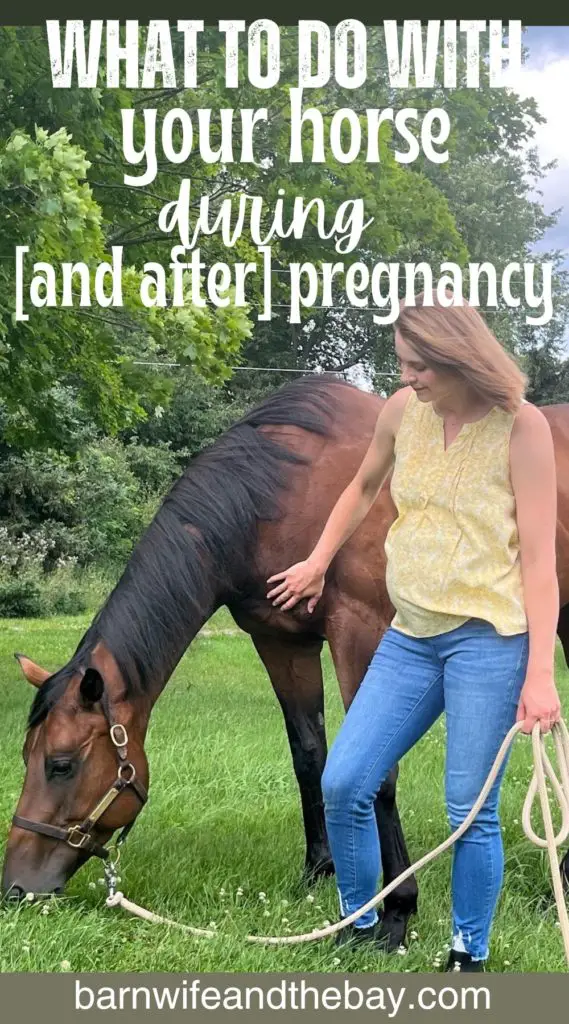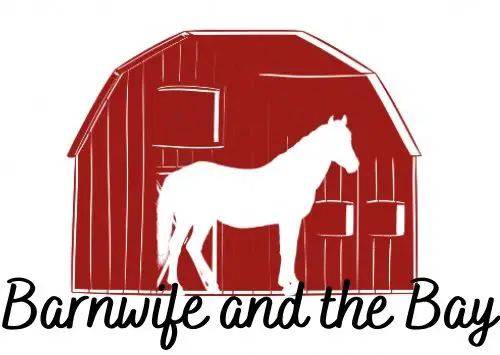
So you’re having a baby. Congratulations! Some options of what to do with your horse during and after pregnancy:
- Continue riding for as long as possible
- Keep working with your horse, but focus on ground work
- Sell your horse
- Keep your horse and give them an extended time off
- Send them to a trainer
- Lease or loan them out to someone else
If it’s your first pregnancy, you might be wondering what it will look like to go through it with your horse.
Jump to:
Physical changes during pregnancy
When I became pregnant, I certainly worried a bit about what to do with my horse.
We hear a lot of the stories of professional riders who keep riding during and after pregnancy. We also hear a lot from very dedicated amateurs who are ubiquitous on the show circuit.
When I was looking for perspectives, I didn’t hear as much from what I’ll call everyday horse owner moms. Especially those with their horses at home, doing the training themselves.
I’d like to share more of that perspective. Here is what to expect as an equestrian during and after pregnancy.
This is what it looked like for me as an amateur training her own horse through pregnancy.
This is my own personal perspective on horsemanship while becoming a mother. I am not a healthcare professional. This is simply my experience of pregnancy, motherhood and equestrianism and is not meant to be taken as medical advice.
Know that whatever you choose to do with your horse during and after pregnancy, your horse will be fine.
Would they be happier if they were ridden regularly? Maybe. I know The Bay would be happier with more work. But are you letting your horse down if you don’t ride for a given amount of time? No you’re not.
When I rode at a big barn, I always used to see flyers for horses for sale. Many said they were selling because they had a baby.
I totally understand that decision. But that was not what I wanted to do, since I had just adopted The Bay less than 2 years before and her training was going well.
There was a time when my baby was about 6-9 months old when I really did seriously consider selling The Bay.
I was having so much fun being a mom and my baby was so interesting to me.
I didn’t know if I wanted my energy diluted by such a huge commitment as training a young horse. But finally I did decide to keep her.
The decision to ride during pregnancy
You have to make your own decision whether or not to ride during pregnancy.
Horseback riding as a pregnant woman is a personal choice. You can make an informed decision you feel comfortable with if you gather a little information and reflect on your priorities.
Be open with your healthcare provider about your activity level and goals.
Some healthcare professionals know what it’s like to be an equestrian, and some don’t.
It’s helpful to get prenatal care from a provider that understands what a big part of your life your horse is, and knows firsthand what horseback riding really is.
If in doubt, don’t ride.
While they say physical activity during pregnancy is a good thing, the American College of Obstetricians and Gynecologists recommends against horseback riding any time during pregnancy because the risk of falling is always present.
It is classified as a high risk activity, along with downhill skiing, ice hockey, and other sports with potential impact or falls.
Training level and age of your horse
Green horses are a much different consideration for pregnant women riders than seasoned, solid citizen types.
The Bay was a fairly level-headed 4 year old when I was pregnant. Even so, my last ride was around the end of the 1st trimester, at 14 weeks.
It was springtime and I don’t have an indoor arena. She saw a deer which she used as an excuse for some exuberant antics and I lost my seat.
I decided I could not risk something like that happening again after 14 weeks.
For the rest of the summer, I concentrated on ground work and invited my friend and neighbor to ride her.
An expectant mother who is a more conditioned athlete with a very trustworthy horse and an indoor arena might feel comfortable with a different decision.
Physical changes during pregnancy that might affect your riding
There are changes in your body each trimester which can affect your riding, and your decision to ride.
First trimester
If it’s your first time being pregnant, some of the changes during this time might surprise you.
Even in the early stages of pregnancy, hormonal changes will start to loosen your joints and tendons.
You might not feel well due to nausea or fatigue. Your body is working so hard making the placenta, it might feel like you don’t have much left for riding.
Second trimester
As your baby bump begins to show, your balance may start to feel a little different.
I began to be a bit frustrated at having to move differently during the 2nd trimester. My abdominal muscles started to stretch out and I had to get used to moving without using my core as much.
At around 12 weeks, the risk of injury to your unborn child increases in the event of a fall, as the uterus starts to outgrow the protection of the bony structure of the pelvis.
Your energy might come back to some extent during the second trimester, and hopefully your nausea will be gone.
Third trimester
The fatigue may return, and your center will be moving very differently as your belly grows.
Your joints and muscles may be very loose compared to pre-pregnancy.
Varicose veins are pretty common in pregnancy, and those can be painful.
Swelling of the feet, legs and ankles may also make some things feel different than they did pre-pregnancy.
Most equestrian moms are done riding by the third trimester.
My experience of riding and working out during pregnancy
When I got pregnant, I read a few articles online from professional equestrian moms.
I had big dreams of hitting my workout goals for the year, as well as my riding goals.
My thought was “I’m an athlete too. I’m not a pro, but I won’t try to do as much as the pros do. I’ll just have my normal workout and horse training goals.”
Even with my very healthy pregnancy (I felt ill during the first trimester, but after that I felt almost totally normal), that was just not reality for me.
I remember one day during my early pregnancy, I did my planned weightlifting workout, then went outside to the barn and tacked up my horse.
I rode, came back inside, and cooked dinner like I normally would. That evening and the next day, I was flat on my back with a migraine, feeling so sick.
That day I learned, MY pregnant body could not necessarily handle that much exercise.
Mental aspects of riding while pregnant
If you’re used to having strong muscles, your mind may offer you frustration and unhelpful feedback as your abdominal muscles stretch and you start to feel weaker. Find a system that works to coach yourself into a more helpful mental space.
It’s natural to think more about the second person who’s riding with you now. Many pros and serious amateurs say that they knew it was time to quit riding when their thoughts started to focus on the safety of their little one.

What to do with your horse if you choose not to ride
The choice to ride or not during pregnancy is a very personal decision based on any number of factors unique to you and your horse. If you choose not to ride, but still want to work with your horse, your training and relationship can still skyrocket during this time.
Here are some ideas to keep training from the ground during pregnancy and after:
- Work on lunging
- Use sidereins to encourage a proper frame during lunging
- Use raised poles for core conditioning during lunging
- Condition yourself and your horse by handwalking on hills
- Go for handwalks in new areas or on trails
- Teach your horse a trick
- Work on showmanship skills
- Practice braiding the mane and tail for future shows
- Just groom and learn your horse’s favorite areas to be scratched
- Learn some equine massage
- Learn some equine bodywork techniques like Masterson Method or T Touch
- Play around with balance pads for your horse. Standing a pair of feet on balance pads can be great for core conditioning
- Teach your horse skills for cooperative veterinary care. These are things like being relaxed for rectal temperature, allowing injections, and offering their eyes for ointment application
- Take your horse’s vitals every week and do a deep dive into what’s normal for their health parameters
- Take some time to rebalance their diet
- And if all else fails, clean tack
After you give birth
After giving birth to your baby, whether it’s your first or fifth, your life will be completely different.
Plan for your horse during and after giving birth
The best time to start planning for horse care during childbirth is during the second trimester. Finish up your baby registry and find someone reliable to take care of your horse.
If your horse is at home, it’s a good idea to make sure someone is on call to take care of them around your due date, and even a few weeks before, in case baby comes early.
Then after you give birth, make sure you have your chores covered for at least a few weeks. You never know how difficult your delivery and subsequent recovery will be.
I had a wonderful boarder who did barn chores for me while I was giving birth and the day after. Then my husband did the daily barn chores for a couple weeks, with my dad helping out.
If you are able to have your horse in full-care board, that would be a great way to have them taken care of the whole time.
If they are boarded, think about how they will continue to get good veterinarian and farrier care. Make sure someone can hold them even if you can’t be there for some farrier or vet visits.
Be kind to yourself
Even if your tummy bounces right back and your body feels pretty good, you’re still not sleeping.
Lack of sleep and interrupted sleep can wreak havoc on your muscle strength, coordination, and mood. All of these will have an effect on your riding and how you show up with your horse.
Give yourself some grace to be where you are and understand that your horse might be experiencing you slightly differently than normal.
Enjoy being a mom
Having a newborn baby is very, very hard. Having a horse is also a big responsibility.
Allow yourself to focus on your baby and the joyful aspects of getting to know them and settling in to your new life.
Rest
The most important thing you can do for yourself, your baby and your horse is rest.
It won’t always be possible to rest of course, as a new mom.
But if you have a chance to rest, take it. You deserve it.
You will have a better relationship with your baby, your life partner and your horse if you are better rested.
Enjoy every moment you can be with your horse
Just spending time hanging out and petting your horse can be great for your mental health in the postpartum weeks and months.
There’s no need to rush getting back in the barn. Every mama’s recovery is different. Definitely follow your doctor’s advice and only do what you feel up to.
I feel grateful that I had a midwife at my hospital discharge who gave me no restrictions whatsoever.
I was itching to do my own barn chores by 2 weeks postpartum.
I waited until 4 weeks to get back on and ride again. I took it easy riding at first because I wasn’t sure how my body would feel. It went really well and soon I felt fitter than ever for riding.
There will be changes to your body after giving birth that will be different for everyone.
Extra tip for breastfeeding moms: Breastfeeding moms, your breasts might just be the biggest change you’ll find in your body postpartum.
Consider getting a really, really good sports bra if you go back to riding while breastfeeding.

Ready to learn more? Check these out:
